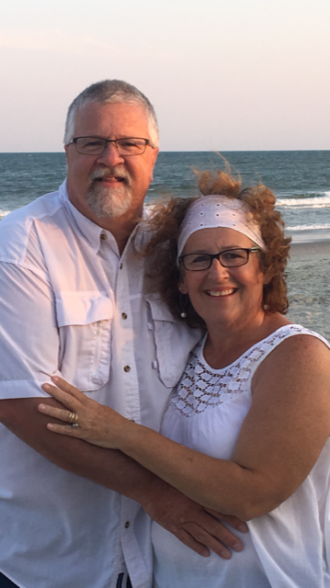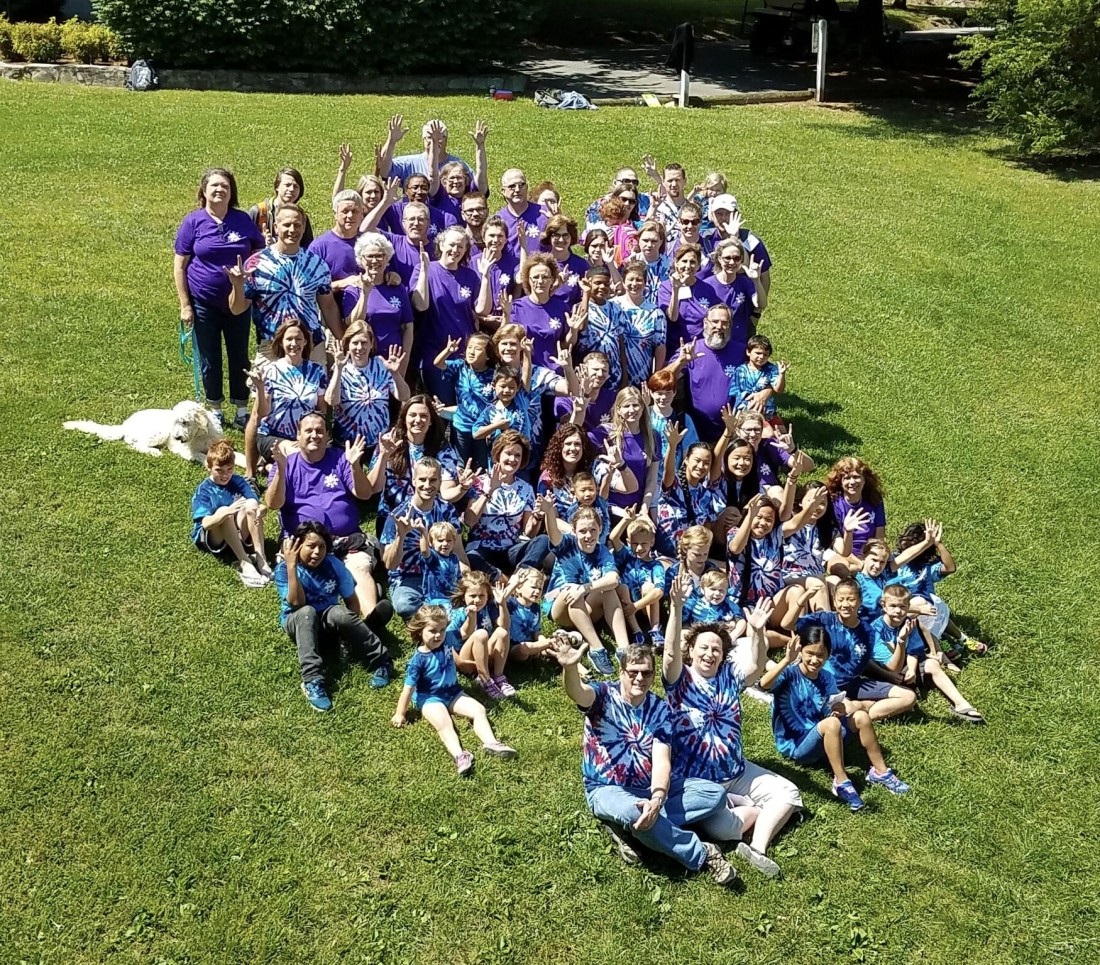Phillip Easterling believes that God created each person with purpose and intention. Born unable to hear the sound of birdsong or music, he says he learned to listen closely with his heart. Now he leads the Asheville Deaf Church as its pastor and travels the globe teaching the Bible.
“God has given me the gift of being able to understand sign language,” he says through an interpreter, Becky Lloyd. “I have visited many countries, and each one has a different sign language, just as they have a different language, although Liberia has many similarities to ours. Within an hour, I can pick up the sign language in other countries well enough to communicate. I use this gift to share God’s words and to tell stories.”
September is Deaf Awareness Month, with a range of activities designed to raise awareness of deaf culture and offer enhanced access to learning and fun. Many of the 35 members of Easterling’s congregation, for example, will go on a deaf camping weekend beginning Saturday, Sept. 29.
“We will join families from Tennessee, Kentucky, South Carolina and Virginia,” Easterling says. “It’s always a good time.”
Social whirl
On Tuesday, Sept. 18, the WNC Nature Center plans an entire day devoted to interpreting the center’s exhibits for the deaf. Keith Mastin, the Nature Center’s education curator, planned the event with guidance from Laura Herman, deaf awareness specialist for the N.C. Health and Human Services Regional Center for the Deaf and Hard of Hearing.
“We set up education stations throughout the center, each station having a particular animal or phylum of species,” Mastin says. “Each station has one member of the deaf community along with an interpreter. I teach the volunteers the station’s information the day prior to the event. We always have a fact sheet for them to read as well.”
Mastin, who is learning American Sign Language, says the day creates opportunities for learning and growth. Last year, a student from the North Carolina School for the Deaf helped Mastin improve his grammar in ASL, and he learned about the language as he taught about the nature displays.
“This particular language, ASL, is beautiful, artistic and functional,” Mastin notes.
On Thursday, Sept. 20, deaf and hearing people will mingle at a social beginning at 6 p.m. at the food court at the Asheville Mall. The event offers an opportunity for deaf and hearing people to experience an environment where many people communicate in sign language, says Ann Karson, a member of the Asheville chapter of the Hearing Loss Association. Members of HLA and the Smokey Mountain Deaf Club will take part, and it’s open to all.
In addition, the Thomas Wolfe Center for Narrative at Lenoir-Rhyne University in Asheville will host Love Makes a Home: The Life of Rebecca Boone at 3 p.m. Saturday, Sept. 29. The play, which features old-time fiddling, will be interpreted in ASL.
Speaking their minds
“American Sign Language has its own rhythms,” Easterling says. “We would like for more hearing people to learn sign language, because then communication can be more straightforward, direct and authentic.”
Lloyd, who interprets for Easterling and attends the Asheville Deaf Church, frequently bridges the gap between hearing and deaf cultures. Nine of her family members were deaf. The Gallaudet Research Institute estimates that 2-4 of every 1,000 people in the United States are deaf, but fewer than 1 in 1,000 are deaf before the age of 18.
“Sometimes, extended family members don’t know how to sign with their own deaf family members,” Lloyd says. “We want to end isolation and increase communication.”
Lloyd, whose grandfather was a prominent deaf educator, directs Signs for Hope, a nonprofit that provides detailed information for those hoping to adopt deaf children. In the 10 years since she founded the organization, she has been to Liberia, Bulgaria, China and the Dominican Republic to facilitate adoptions of deaf children. Easterling and his wife have been active in many of these journeys.
“We make sure that families who adopt have the resources they need, so that child can attain permanency,” Lloyd says. “The most rewarding thing is to watch these children thrive with their families. In the most successful adoptions, the parents either are deaf themselves or know American Sign Language, and the family can communicate.”
Deaf children who have the opportunity to interact with other people who are deaf often succeed and have enhanced self-confidence, Easterling says. But sometimes, even with the best of intentions, hearing people talk down to deaf people, as if not hearing indicated a lack of other strengths, he says. Lloyd notes that mutual respect makes a huge difference.
“The greatest challenge we face comes when a child has language deprivation from birth,” Lloyd says. “We have found children even as old as 13 [who were] born deaf and given no language to use for communication. Even in the United States, it isn’t uncommon for children to enter school before being exposed to sign language.”
Easterling’s mother started learning ASL when her son was a toddler and reinforced his interest in visual cues. His sister, too, became deaf, although both of his parents have hearing.
“I was one of the lucky ones,” he said. “I went to a really good school, and that’s where I met my wife.”
After meeting his wife, Elaine, at a school for the deaf in Spartanburg, S.C., Easterling thought he had his life planned out. But his ambition to become a photographer took a different tack after a series of phone calls from Ohio changed his family’s life.
Unexpected call
“When I first got called by the committee hoping to start a deaf church in Ohio, I told them they had the wrong number,” Easterling recalls.

The committee persisted, and Easterling’s family prayed for guidance. Since he first felt called to the ministry, the couple and their two children have lived and started deaf churches in South Carolina, Ohio, Alabama and North Carolina. Easterling founded the Asheville Deaf Church, which meets at Long Shoals Baptist Church in Arden, in 2011.
“We are a relatively small community, so we have an all-inclusive, ecumenical church,” Easterling explains. “Our church is open to anyone, hearing or deaf. We’d like to have more hearing people attend our services and build cultural understanding.” The church’s congregants represent many Christian denominations: Catholic, Free Will Baptist, Southern Baptist, Methodist, Lutheran and more.
“A deaf church differs from a church with an interpreter,” Easterling explains. “Everyone interprets a little differently, and as a deaf man, if I’m watching an interpreter and don’t know a sign, I have to figure out the context. By the time I get past that moment, the speaker may be on a completely different topic. In a deaf church, everyone signs. We can talk in groups, taking time to discuss and explore the Scripture.”
Events across the state can be found at deafncevents.com. For example, deaf people in Asheville have access to movies with closed-caption translation machines, whereas a larger city like Fayetteville hosts monthly open-caption nights at the movies. Two-thirds of the global population, however, can’t read, which makes signing even more important in other countries. Learning sign language may not be easy for everyone, but the more we know, the more compassion and understanding we have for each other, Easterling says.
“It’s so important to reinforce autonomy,” Easterling says. “We all deserve the right to make decisions about our own lives.”
Editor’s note: Writer Kiesa Kay is the author of the play Love Makes a Home: The Life of Rebecca Boone, which will be interpreted in ASL at a performance on Saturday, Sept. 29.
Kay points out that many members of the deaf community prefer to uppercase the word “deaf” in certain contexts, such as the Deaf community or Deaf culture. As is our usual practice, Xpress has chosen to follow Associated Press capitalization guidelines in this story.



Before you comment
The comments section is here to provide a platform for civil dialogue on the issues we face together as a local community. Xpress is committed to offering this platform for all voices, but when the tone of the discussion gets nasty or strays off topic, we believe many people choose not to participate. Xpress editors are determined to moderate comments to ensure a constructive interchange is maintained. All comments judged not to be in keeping with the spirit of civil discourse will be removed and repeat violators will be banned. See here for our terms of service. Thank you for being part of this effort to promote respectful discussion.